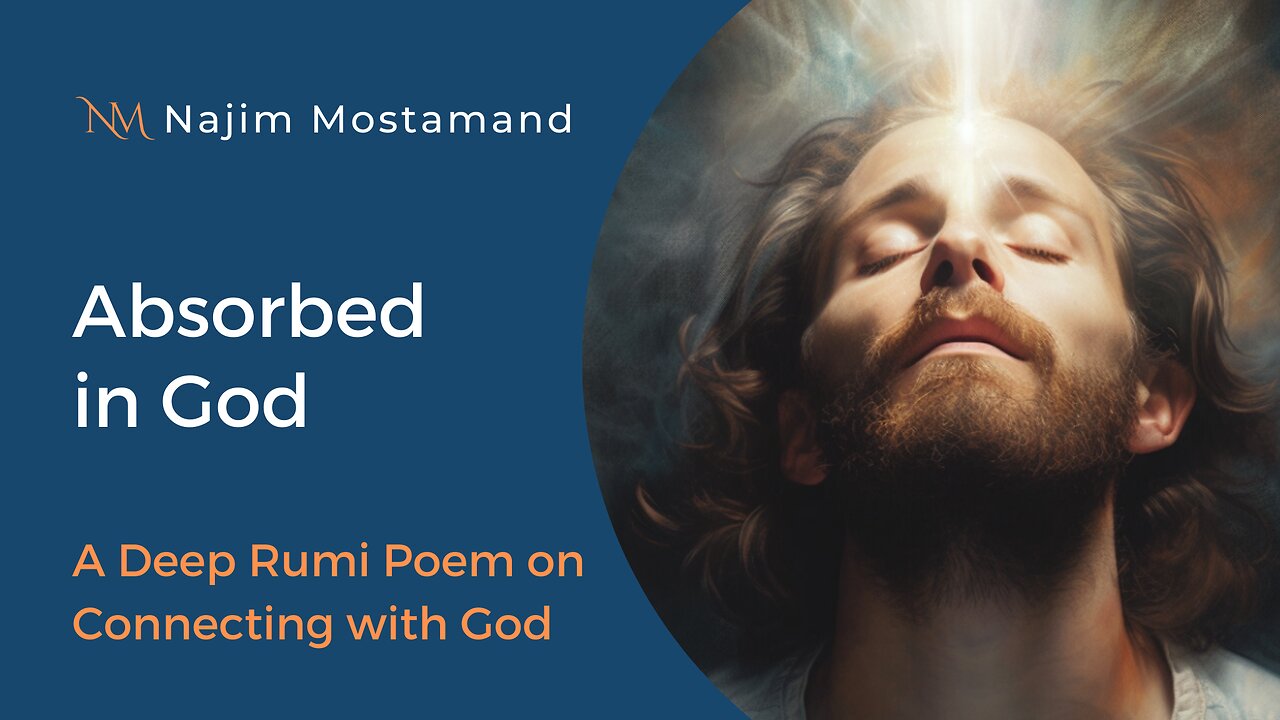Premium Only Content

Absorbed in God: A Deep Rumi Poem on Connecting with God
In this video analysis of Rumi's poem "Absorbed in God," we explore the rich symbolism and spiritual truths embedded within his poetry.
While Rumi may have died centuries ago, his spirit and wisdom live on in each and every one of us. Throughout the video, we explore the different layers of meaning within the poem and how they relate to our spiritual journey.
If you are someone who loves Rumi, is interested in spirituality and growth, or enjoys poetry and deep thinking, then this video is for you.
Don't forget to drop a like and subscribe to the channel to become a part of this growing community of like-hearted souls who crave to grow spiritually.
Sending peace and love to all!
#rumi #rumipoetry #rumipoem
---
If you are looking for more guided meditations, spiritual poetry, and ancient wisdom for awakening, please subscribe to my YouTube channel and follow me on social:
https://www.youtube.com/c/NajimMostamand
Website: https://najimmostamand.com/
Instagram: https://www.instagram.com/najimmostamand/
Facebook: https://www.facebook.com/najimmostamand1/
Patreon Donation Page: https://www.patreon.com/najimmostamand
Medium: https://medium.com/@namostamand
© 2023 Najim Mostamand
Music by Cousin Silas ("Lamella," "The Migration" and "Parade")
Check out Dave's incredible music here:
https://cousinsilas1.bandcamp.com/
https://soundcloud.com/cousin-silas
This video is dedicated to God and all His wonderful glory. May His endless light, love, and wisdom continue to guide us all back Home.
---
The light of the senses and spirit of our ancestors
doesn't perish like the grass,
but, like the stars and moonbeams,
they vanish in the radiance of the Sun.
It's like the naked man who jumped into the water,
so that he might escape from the hornets' stings:
the hornets circled above him, and whenever he put out his head
they would not spare him.
The water is recollection of God,
and the hornet is the thought, during this time,
of such-and-such a woman or man.
Hold your breath in the water of remembrance,
so that you may be freed from old thoughts and temptations.
After that, you will assume the nature of that pure water,
entirely from head to foot.
As the noxious hornet flees from the water,
so...it will be afraid of approaching you.
After that, be far from the water, if you wish;
for in your innermost soul you are of the same nature as the water.
Those persons then who have passed from the world
are not nonexistent but are absorbed in the attributes of God,
even as the star disappears in the presence of the sun.
~ Maulana Jalaluddin Rumi
---
Rumi, born Jalal ad-Din Muhammad Balkhi, was a 13th-century Persian poet, Islamic jurist, and theologian who is widely regarded as one of the greatest spiritual poets in history. He was born on September 30, 1207, in Balkh, in present-day Afghanistan, and later settled in Konya, in present-day Turkey, where he spent most of his life.
Rumi's early years were marked by his father's influence, who was a prominent Islamic preacher and theologian. Rumi grew up immersed in the teachings of Islam and became well-versed in various branches of Islamic knowledge, including jurisprudence, theology, and Sufism. However, his life took a transformative turn when he met the wandering dervish Shams Tabriz, who became his spiritual mentor and kindled in him a deep longing for divine union.
Rumi's spiritual journey with Shams Tabriz inspired him to write poetry as a means to express his profound mystical experiences and deep yearning for God. His poetry, written in Persian, is renowned for its spiritual depth, eloquence, and universal appeal. Rumi's poetry is characterized by themes of love, divine longing, union with God, and the quest for inner illumination. His words have the power to transcend cultural, religious, and linguistic boundaries, resonating with people of different faiths and backgrounds across the world.
Rumi's most famous work is his Masnawi, a collection of poetic stories, parables, and teachings that span over 25,000 verses. The Masnawi is considered a spiritual masterpiece and is often referred to as the "Quran in Persian." Rumi's poetry reflects his belief in the power of love as the ultimate path to God and emphasizes the importance of transcending superficial differences and connecting with the divine essence within oneself and others.
Rumi's poetry has had a profound impact on millions of people around the world, transcending time and culture. His words continue to inspire seekers of truth and lovers of God to this day, reminding them of the eternal beauty of divine love and the transformative power of spirituality. Rumi's legacy as a spiritual poet and mystic continues to shine brightly, serving as a guiding light for those on the path of spiritual awakening and enlightenment.
-
 25:55
25:55
Najim Mostamand
8 months agoDealing with Unawakened People on Your Spiritual Journey
21 -
 LIVE
LIVE
LFA TV
14 hours agoLFA TV ALL DAY STREAM - MONDAY 7/14/25
6,650 watching -
 LIVE
LIVE
The Bubba Army
2 days agoHogan's Wife Responds To Bubba! - Bubba the Love Sponge® Show | 7/14/25
1,811 watching -
![Breaking News: Ghislaine Maxwell READY TO TALK About Epstein Clients List [EP4631-8AM]](https://1a-1791.com/video/fww1/b5/s8/1/8/Y/2/1/8Y21y.0kob-small-Breaking-Ghislaine-Maxwell-.jpg) LIVE
LIVE
The Pete Santilli Show
15 hours agoBreaking News: Ghislaine Maxwell READY TO TALK About Epstein Clients List [EP4631-8AM]
1,626 watching -
 10:18
10:18
BlackBeltBarrister
1 hour agoTwo Tier Clear as Day?
131 -
 58:38
58:38
MTNTOUGH Podcast w/ Dustin Diefenderfer
7 hours agoSteve Decker: Conserve Habitat, Empower Hunters | MTNPOD #124
139 -
 0:47
0:47
WildCreatures
3 days agoGopher hits the snooze button and goes back to sleep in the sunshine
7212 -
 16:52
16:52
Chris From The 740
10 hours agoBest Budget Green Dot with DPP Footprint? Meet the Gideon Storm!
841 -
 22:39
22:39
Forrest Galante
11 hours agoPrivate Tour of Australia's Craziest Zoo
32.3K11 -
 13:10
13:10
Side Scrollers Podcast
1 day agoGen Z Tries Super Mario Bros 2 for the First Time
38.3K11